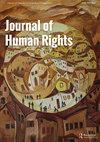Closing chapters of the past? Rhetorical strategies in political apologies for human rights violations across the world
IF 1.6
2区 社会学
Q3 INTERNATIONAL RELATIONS
引用次数: 3
Abstract
Abstract Over the past decades, an increasing number of countries have apologized for human rights violations in the recent or distant past. Although this has led to considerable debate about the value and meaning of apologies and their potential as a transformative mechanism, little is known about how countries across the world try to address and redress past wrongdoings in these statements. Relying on a database of apologies that have been offered worldwide by states or state representatives for human rights violations, we identified various rhetorical strategies that diverse countries use—to varying degrees—to (1) break from or acknowledge past wrongdoings, (2) bridge past wrongdoings with future intentions, and (3) bond with the intended recipients of the apology. In this article, we shed light on the strategies we identified in this regard. In doing so, we show how countries and their representatives use apologies not only or necessarily to address the needs of victims or their relatives, but also to portray and understand themselves, whereby there is substantial overlap in the types of rhetorical strategies and scripts that they use to accomplish this.结束过去的篇章?世界各地对侵犯人权行为的政治道歉的修辞策略
在过去的几十年里,越来越多的国家为最近或遥远的过去的侵犯人权行为道歉。尽管这引发了关于道歉的价值和意义及其作为变革机制的潜力的大量争论,但对于世界各国如何试图解决和纠正这些声明中过去的错误行为,人们知之甚少。根据世界各国或国家代表就侵犯人权行为提供的道歉数据库,我们确定了不同国家在不同程度上使用的各种修辞策略,以(1)断绝或承认过去的错误,(2)将过去的错误与未来的意图联系起来,以及(3)与道歉的预期接受者建立联系。在本文中,我们将阐明我们在这方面确定的策略。在此过程中,我们展示了国家及其代表如何使用道歉不仅或必须解决受害者或其亲属的需求,而且还描绘和理解自己,因此在他们用来实现这一目标的修辞策略和脚本类型中存在大量重叠。
本文章由计算机程序翻译,如有差异,请以英文原文为准。
求助全文
约1分钟内获得全文
求助全文

 求助内容:
求助内容: 应助结果提醒方式:
应助结果提醒方式:


